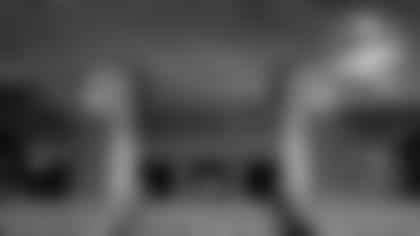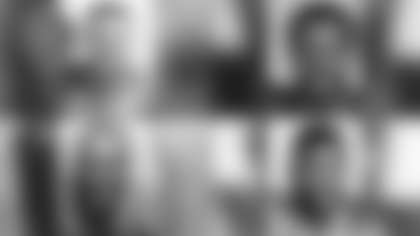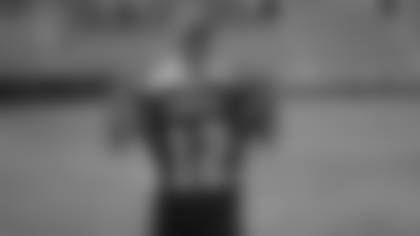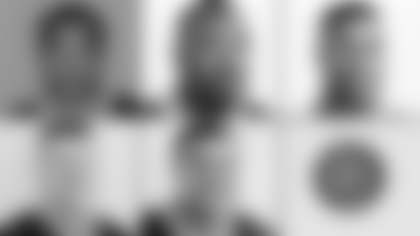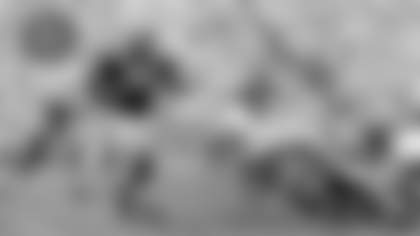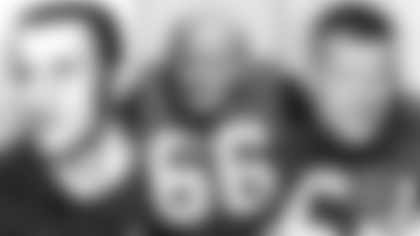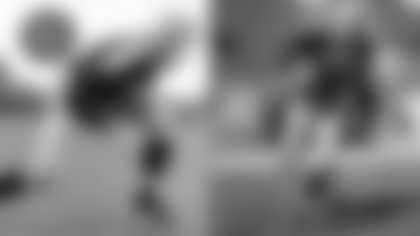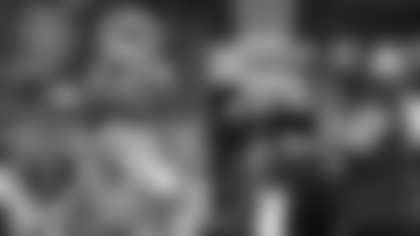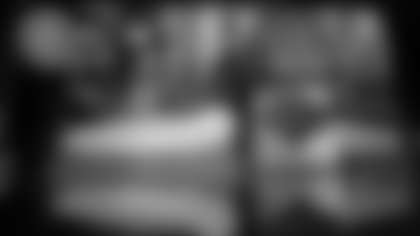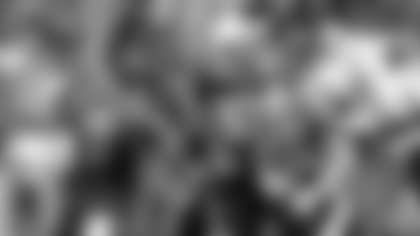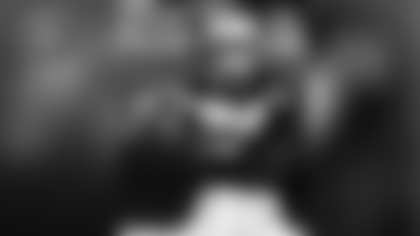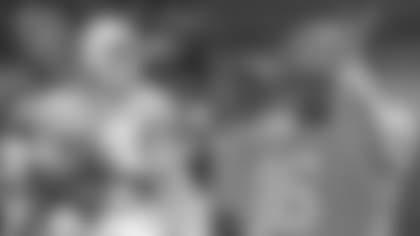Cliff Christl started gathering oral histories with former Packers and others associated with the team in 2000 and will continue to gather them as Packers historian. Excerpts from those interviews will be periodically posted at www.packers.com.
Best remembered as the voice of the Milwaukee Braves during their heyday in the 1950s, Earl Gillespie also had ties to Green Bay and the Packers. A product of Chicago's Lane Technical High School, Gillespie was 17 years old when he signed to play minor league baseball in Green Bay. A first baseman, Gillespie played for the Green Bay Bluejays from 1940-42 and again in 1946, although he was traded to Fond du Lac in July 1941 and finished the season there before returning to Green Bay. The Bluejays were members of the Class D Wisconsin State League from 1940-42 and from '46-53. The league suspended play for three seasons during World War II and Gillespie served his country as a fighter pilot during that time. In 1947, Gillespie launched a 40-year career as a Wisconsin sportscaster with Green Bay radio station WJPG. He worked with the station through 1950 and then joined WEMP radio in Milwaukee in 1951. A year later, he became the radio voice of the Packers and worked their games through 1956. In 1964, he broadcast Packers games on CBS television. Gillespie announced Braves baseball for 11 years and University of Wisconsin football for 31.
On the relationship between the Packers and Green Bay Bluejays: "We would hang out together. Don Hutson would work out with us before the season. The Green Bay Bluejays, we'd come into town in April or March. We'd spring train right there in the cold weather. We'd meet a lot of pretty girls. We'd meet at Oliver's Ice Cream (Shop). Then in July, the Packers would walk in. 'Good-bye boys.' That was the end of the Bluejays. The players on the two teams dated a lot of the same women."
On how the older Packers interacted with the mostly younger Bluejays: "Pro football players were funny. They'd have a fight over something in the bar after a game. They'd have too many beers. After a game, they'd go out and let it all cut loose. There was a lot of pressure on those guys."
On Hutson's Packers Playdium bar and bowling alley on Adams Street: "When it opened it was great. That's where Tony (Canadeo) met (his wife) Ruth. It was something for Green Bay. A big bowling alley, lovely cocktail lounge. A lot of players hung out there and the women followed."
On Pro Football Hall of Famer Tony Canadeo: "My all-time favorite Green Bay Packer. Tony was a great ballplayer. He had a 1,000-yard season in ('49), I think it was, and he was asking for a raise from Curly Lambeau. Curly wasn't going to give it to him. So I went on a campaign with Tony's brother, Savvy Canadeo, pushing for Tony to get a raise. You know what he got for a raise? His salary was $9,000. I don't think Curly ever forgave me; he did just before he died. I conducted the campaign largely on radio broadcasts."
On Canadeo's running style: "He was tough. Canadeo used to scream at the opponents when he was carrying the ball. He'd swear, 'You son of a b----,' at the top of his lungs. Like a Jimmy Taylor, but not as tough as Taylor. That type of runner. In the old Notre Dame Box, Canadeo was a threat as both a runner and passer."
On Lambeau: "A dynamic guy. His presence was felt when he walked into a room full of people. Curly just stood out. I don't know if the ballplayers liked him that much, but they admired him and respected him."
On Lambeau's reputation as a womanizer: "He was a handsome guy, you know. A beautiful dresser. Good-looking. Gray hair on the side. Everybody in town knew he was a ladies man. When I played for the Bluejays, (team president) Len Reis was dating Marguerite Lambeau, Curly's ex-wife."
On his personal relationship with Lambeau: "I covered all the practices at Rockwood Lodge and Lambeau gave me a sideline pass for the games. He was like (Vince) Lombardi on the sidelines."
On Rockwood Lodge, located just south of Dyckesville, Wis., and the Packers' training quarters from 1946-49: "The guys didn't like it too much (because of the rock formation under the practice field), but it was a nice set-up. Good quarters and good food. Curly had the right idea. He had the team together."
On the Astor Hotel on Adams Street: "That's where the guys used to stay. All the girls from the Kellogg (Bank) Co. would walk by very slowly past the Astor Hotel. Later, the girls from the (Wisconsin) Telephone Co. would do it."
On where he lived: "I paid $7 a week for room and board in Green Bay. I lived in a house on Cherry Street."
On other downtown Green Bay hangouts at the time: "There was a place called 'Goog' McWey's (Tavern), where they used to hang out, right across the street from Oliver's. Oliver's was kitty-corner from the Northland Hotel and McWey's was across the street from Oliver's. Chili John's. A lot of players ate at the YWCA. Also, there was a Hopkins Drug Store with counter service around the corner from Bosse's (News Depot)."
On the Packers-Bears rivalry in the late 1940s: "One of their players hurt a Green Bay Packer. Hit him from behind. A dirty play. So we go to Chicago and I'm in the trainer's room with (trainer) Bud Jorgensen. About four, five players are sitting around talking about how they're going to get this guy, Lee Artoe. By george, I said to my brother, a Bear fan – we were born and raised in Chicago – 'You watch tomorrow, Artoe is going to be out of that ballgame.' About the fourth play of the game, they carried (Artoe) out."
On the train rides to Chicago: "I traveled on the train with the Packers to Chicago. The players would mostly play cards: hearts and gin rummy. On the way back, they'd be allowed to drink beer."
On George Whitney Calhoun, Packers co-founder and Green Bay Press-Gazette telegraph editor: "He didn't like me too much. He was so Green Bay Packer. My god! Mr. Andrew Turnbull (Press-Gazette owner and first Packers president) would have me come in and give him a report from Rockwood Lodge. Calhoun would be listening and growling over at his desk. What a colorful guy. Gruff. But very interesting."
On Bob Conrad, who worked for Lambeau as a part-time scout in the late 1940s: "He worked for the Miller Brewing Co. I didn't like Bob. I was doing the Packer games in the '50s and he'd go on the road trips with us. I never got along with him. Bossy, irritatingly bossy. I threw a glass at him one time as he left my room. It was at Dallas. We were playing the Dallas Texans."
On Gene Ronzani, who succeeded Lambeau as coach: "I loved the guy. He recommended I take the job in Milwaukee if I wanted to be the Packers' play-by-play announcer."
On Fred Miller, president of Miller Brewing Co., sponsor of the Packers' radio broadcasts and an honorary assistant coach under Ronzani: "He was a great football fan. I had to report to him when I was in Milwaukee: Tell him what was going on up in Green Bay, Wis., during those early '50s days. He was a very ardent football fan. Wonderful man, wonderful man. I don't think he was real involved with the team, just a backer."
On Oliver Kuechle, sportswriter for The Milwaukee Journal, Lambeau's friend and harsh critic of the Packers' executive committee during the late 1940s and '50s: "He was a great Packer fan, but he didn't want to show it in his column. He was critical and so was Russ Lynch (sports editor of the Journal)."
On the Packers' postgame get-togethers in the 1940s and '50s: "I'd go out to dinner with the players after the games on Sundays. We'd go to Pat Golden's Golden Inn (on Riverside Drive in Allouez). The Union Hotel (in De Pere). Good steaks and the guys loved it."
On Larry Craig, Packers blocking back and defensive end from 1939-49 nicknamed "Superman" by his teammates: "Popular. Good-looking. Real tough defensive end. (Gosh), he had a gorgeous build. The women in town were very fond of Larry Craig."
On Ed Neal, Packers 300-pound center and middle guard from 1945-51 and a blacksmith by trade: "Lovable. On a train ride from Chicago to Green Bay after a Bear game, he took an empty bottle and broke it over his forearm. Strong!"
On Bob Forte, Packers linebacker and back, 1946-50, '52-53: "A class guy. Tough. Loved to hit. Captain Bob Forte. I worked the broadcasts with him later."
On Tobin Rote, Packers quarterback 1950-56: "There was a great quarterback. I watched him one day in Chicago. The Bears got through his mask and broke his nose. There was blood all over him. He went back in and threw a touchdown pass. Tobin Rote was a great guy. A big, tough guy."
On broadcasting from City Stadium, home to the Packers from 1925-56: "It was beautiful. We were close to the field."
On broadcasting from State Fair Park, the Packers' Milwaukee home from 1934-51: "The press box was a long way from the field, as were many of the seats."
On broadcasting with Tony Canadeo, when he was the analyst: "Tony would get up so tight before a Bear game, he'd go in the bathroom and you could hear him throwing up."
On broadcasting games when Vince Lombardi was coaching: "I remember we lost a game by a field goal against the Baltimore Colts in Green Bay. That was 1964. It was a heartbreaking loss. I was invited to the post-Packer party at Lombardi's house. Tom Miller, who was a good friend of mine, said, 'Now don't talk about the game. Lombardi is a tough loser.' I saw him standing at the bar down his basement and Vince walked over. I said, 'Hey Vince, what a tough ballgame.' He said, 'Yeah,' and started to talk about it. Everybody was afraid of him. I felt as bad as he did about losing. I think Tom Miller was surprised."
Gillespie died in 2003 at age 81. The interview above was conducted in 2003.



